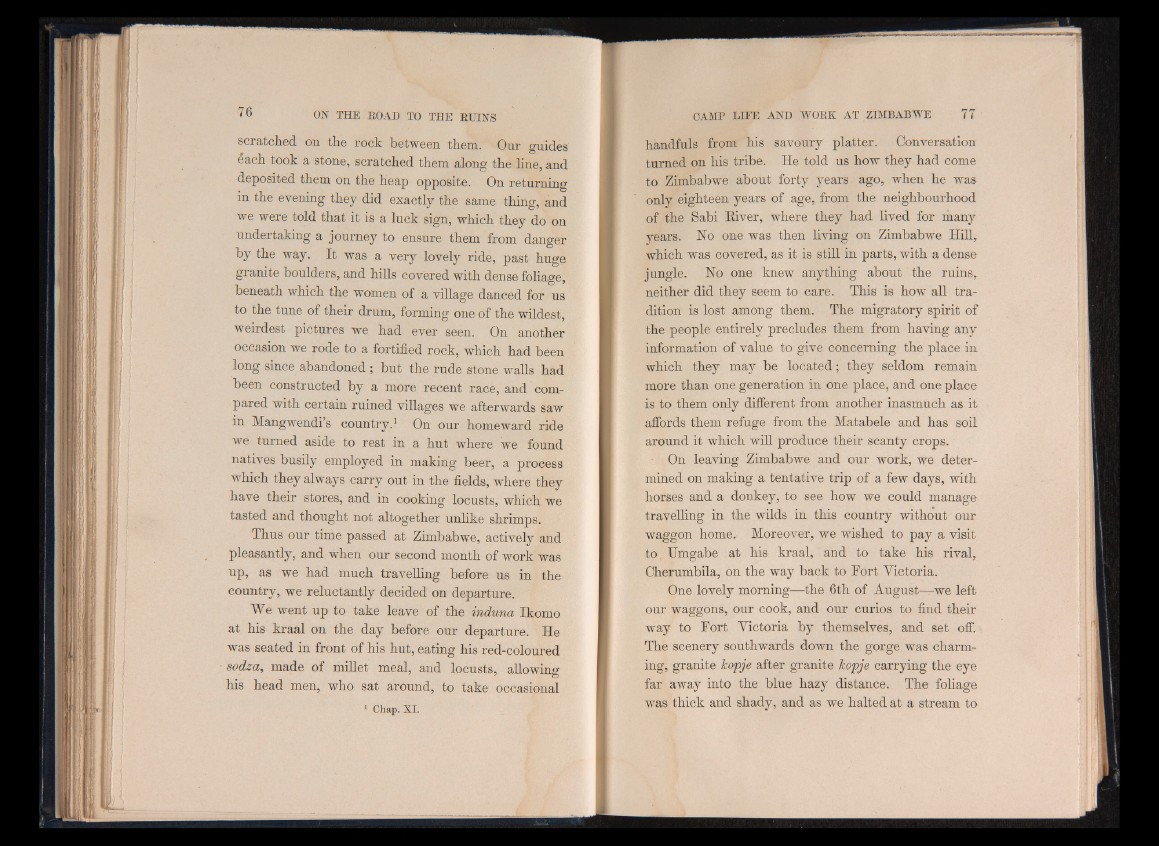
scratched on the rock between them. Our guides
each took a stone, scratched them along the line, and
deposited them on the heap opposite. On returning
in the evening they did exactly the same thing, and
we were told that it is a luck sign, which they do on
undertaking a journey to ensure them from danger
by the way. It was a very lovely ride, past huge
granite boulders, and hills covered with dense foliage,
beneath which the women of a village danced for us
to the tune of their drum, forming one of the wildest,
weirdest pictures we had ever seen. On another
occasion we rode to a fortified rock, which had been
long since abandoned ; but the rude stone walls had
been constructed by a more recent race, and compared
with certain ruined villages we afterwards saw
in Mangwendi s country.1 On our homeward ride
we turned aside to rest in a hut where we found
natives busily employed in making beer, a process
which they always carry out in the fields, where they
have their stores, and in cooking locusts, which we
tasted and thought not altogether unlike shrimps.
Thus our time passed at Zimbabwe, actively and
pleasantly, and when our second month of work was
up, as we had much travelling before us in the
country, we reluctantly decided on departure.
We went up to take leave of the induna Ikomo
at his kraal on the day before our departure. He
was seated in front of his hut, eating his red-coloured
sodza, made of millet meal, and locusts, allowing
his head men, who sat around, to take occasional
1 Chap. XI.
handfuls from his savoury platter. Conversation
turned on his tribe. He told us how they had come
to Zimbabwe about forty years ago, when he was
only eighteen years of age, from the neighbourhood
of the Sabi River, where they had lived for many
years. No one was then living on Zimbabwe Hill,
which was covered, as it is still in parts, with a dense
jungle. No one knew anything about the ruins,
neither did they seem to care. This is how all tradition
is lost among them. The migratory spirit of
the people entirely precludes them from having any
information of value to give concerning the place in
which they may be located; they seldom remain
more than one generation in one place, and one place
is to them only different from another inasmuch as it
affords them refuge from the Matabele and has soil
around it which will produce their scanty crops.
On leaving Zimbabwe and our work, we determined
on making a tentative trip of a few days, with
horses and a donkey, to see how we could manage
travelling in the wilds in this country without our
waggon home. Moreover, we wished to pay a visit
to, Umgabe at his kraal, and to take his rival,
Cherumbila, on the way back to Fort Victoria.
One lovely morning—the 6th of August—we left
our waggons, our cook, and our curios to find their
way to Fort Victoria by themselves, and set off.
The scenery southwards down the gorge was charming,
granite Tcopje after granite kopje carrying the eye
far away into the blue hazy distance. The foliage
was thick and shady, and as we halted at a stream to